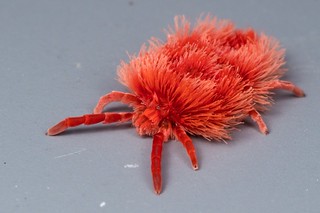Division entomologist clears up myths about chiggers and ticks
By Matt McGowan
U of A System University Relations
May 4, 2018
Fast Facts:
- Dowling lays out facts about chiggers and ticks
- Describes the pests in University of Arkansas podcast
(265 words)
PHOTO available for download: https://flic.kr/p/244CQWu
FAYETTEVILLE —In the new edition of Short Talks From the Hill, a podcast from the University of Arkansas, Ashley Dowling explains exactly what happens when chiggers bite us.

BUGGED — The velvet mite is the adult stage of the common chigger.
Photo by Ashley Dowling
“They do not burrow into our skin,” Dowling says in the podcast. “When they get on us, they basically make a wound in the skin. They're not feeding on blood even, they're just feeding on skin cells. So they make a little wound, and then they inject enzymes through saliva, which dissolves the skin cells, and then they're basically slurping that up.”
Dowling is an associate professor of entomology for the University of Arkansas System Division of Agriculture and the Dale Bumpers College of Agricultural, Food and Life Sciences. Researchers in his lab study micro-arthropods, focusing specifically on mites.
In the podcast, he describes chiggers as a type of mite called a velvet mite, which, during the larvae stage, feed on humans and other species, and then later become colorful and “charismatic” as adults.
Dowling also studies ticks. In the podcast, he discusses an important citizens-science projectdesigned to reduce tick-borne diseases in Arkansas.
To learn more about Dowling’s research and these pesky pests, go to ResearchFrontiers.uark.edu, the home of research news at the University of Arkansas. Listeners can also find Short Talks From the Hillpodcasts under the “Local & Podcast” link at KUAF.com.
Short Talks From the Hillhighlights research and scholarly work at the University of Arkansas. Each segment features a university researcher discussing his or her work. For more information and additional podcasts, click on the Multimedia link at ResearchFrontiers.uark.edu.
About the Division of Agriculture
The University of Arkansas System Division of Agriculture’s mission is to strengthen agriculture, communities, and families by connecting trusted research to the adoption of best practices. Through the Agricultural Experiment Station and the Cooperative Extension Service, the Division of Agriculture conducts research and extension work within the nation’s historic land grant education system.
The Division of Agriculture is one of 20 entities within the University of Arkansas System. It has offices in all 75 counties in Arkansas and faculty on five system campuses.
Pursuant to 7 CFR § 15.3, the University of Arkansas System Division of Agriculture offers all its Extension and Research programs and services (including employment) without regard to race, color, sex, national origin, religion, age, disability, marital or veteran status, genetic information, sexual preference, pregnancy or any other legally protected status, and is an equal opportunity institution.
###
Media Contact: Fred Miller
U of A Division of Agriculture
Arkansas Agricultural Experiment Station
(479) 575-5647
fmiller@uark.edu